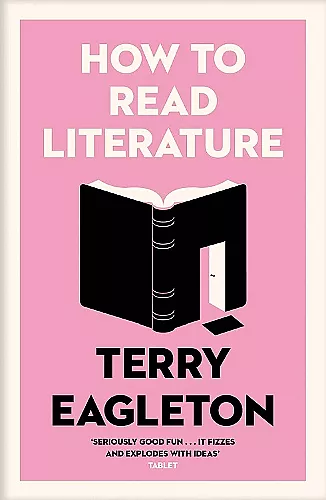How to Read Literature
Format:Paperback
Publisher:Yale University Press
Published:13th Aug '19
Should be back in stock very soon

A literary master’s entertaining guide to reading with deeper insight, better understanding, and greater pleasure
What makes a work of literature good or bad? How freely can the reader interpret it? Could a nursery rhyme like Baa Baa Black Sheep be full of concealed loathing, resentment, and aggression? In this accessible, delightfully entertaining book, Terry Eagleton addresses these intriguing questions and a host of others. How to Read Literature is the book of choice for students new to the study of literature and for all other readers interested in deepening their understanding and enriching their reading experience.
In a series of brilliant analyses, Eagleton shows how to read with due attention to tone, rhythm, texture, syntax, allusion, ambiguity, and other formal aspects of literary works. He also examines broader questions of character, plot, narrative, the creative imagination, the meaning of fictionality, and the tension between what works of literature say and what they show. Unfailingly authoritative and cheerfully opinionated, the author provides useful commentaries on classicism, Romanticism, modernism, and postmodernism along with spellbinding insights into a huge range of authors, from Shakespeare and J. K. Rowling to Jane Austen and Samuel Beckett.
"Part of the fun of the book is the way in which Eagleton prompts, provokes and at times infuriates. How to read How to Read Literature? . . . as an ideal introductory guide to critical analysis, and a thoroughly enjoyable reminder of Eagleton’s own skill and subtlety as a reader."—Felicity James, Times Higher Education Supplement
"A pleasingly readable overview of what we talk about when we talk about books. . . . Incisive and honest."—Michael Washburn, Boston Globe
"How to Read Literature is a lively and engaging primer on basic strategies for appreciating literature, a kind of English 101 in a book."—Washington Post
"This is Eagleton at his most charming and an excellent guide for literature students early in their education or those seeking a refresher course."—Publishers Weekly
"This book is seriously good fun. Teachers should pounce on it with glee, especially if they have tried for weary years to tell students, daunted by having to comment on great literary works, that poems and novels are not alarming, for they are composed only of words. Of course students themselves may not read the book, students being what they are, but those entrusted with their education should rejoice. It is, says Terry Eagleton in his preface, a guide for beginners. But it is much more than that. Like fireworks over Sydney harbour, it fizzes and explodes with ideas. You don’t have to be either teacher or beginner to relish it: Eagleton is so full of enthusiasm that you just need to be able to read. His canvas is broad. He is unafraid of tackling anything, from “Baa Baa Black Sheep” to “Lycidas”, and he is splendidly unpompous."—Sue Gaisford, Tablet
"Eagleton is alive to the complexity of literature and to a commonsense clarity. . . . In a cheering way, Eagleton believes in literary value and thinks an inability to recognise it would be as absurd as someone who is into single-malt whisky not being willing to admit a great one when he tasted it. . . . This is as brilliant as an absolutely sensible book about literature could be. Anyone intrigued by the subject, as well as quite a few who have long been bemused by it, will read it with intense pleasure."—Peter Craven, The Sydney Morning Herald
"This is not only an entertaining book, it's an important one. What Eagleton refers to as "slow reading", after Nietzsche, seems horribly endangered as a human activity. He draws us back to basics here, in a sequence of sharp analyses, taking into account the essential aspects of intelligent reading. I love his breezy style, so accessible and concrete; yet he never sacrifices nuance or subtlety. This is a book for every reader, not only beginners, yet it will prove immensely useful in the classroom."—Jay Parini, author of Why Poetry Matters
ISBN: 9780300247640
Dimensions: 197mm x 127mm x 22mm
Weight: 181g
232 pages